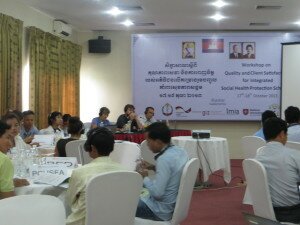
17 January 2014
Background
With the aim of advancing social health protection in Cambodia, operators of social health protection schemes across Cambodia joined forces to establish an association that would allow for a collective voice and provide a platform for collaboration. The initiative would also enable access to quality technical support, attracting financial resources; and promote information sharing and policy development within the sector.
Therefore, a number of organisations joined hands and contributed to the establishment of a new capacity development institute for NGOs active in the social health protection sector e.g. as operators for the Health Equity Funds (HEF), integrated social health protection schemes (extended HEFs through voluntary enrolment programmes), and Micro Health Insurance (MHI). This new institute, the Social Health Protection Association (SHPA), began its operations, with support of GIZ, in May 2012.
SHPA’s mission is to support and promote the quality, sustainability and coverage of voluntary enrolment programmes and other social health protection schemes in Cambodia.
Its main objectives are to support social health protection schemes:
- To provide a collective voice and platform for collaboration;
- To establish a high-quality resource centre for all social health protection schemes; and
- To provide an information and communication platform for all stakeholders.
To fulfill its aims, SHPA developed a work-plan, based on key support needs identified by its members, with additional inputs from the Ministry of Health and other key partners. In line with the plan, SHPA organised various workshops and capacity building trainings.
Client Satisfaction and Quality improvement
The majority of the Cambodian population initiates medical treatment in the private sector. Approximately 30% initiates care in public health facilities. The main reason for this is the perceived low quality of care in the public sector. Many Cambodians prefer private providers because they are seen as friendlier and more responsive to patients’ needs, even if the technical quality of services is inferior to that provided in the public sector.
Improving misperceptions of the quality of public health services, and thus overall client satisfaction, is essential to ensure optimal operations of a social health protection scheme. The Ministry of Health guidelines for SHP schemes require operators to address these issues through specific activities to monitor and respond to clients’ feedback. In response, a client Satisfaction Survey Tools (CSST) was developed by the Quality Assurance Office of the Ministry in 2009 with assistance from GIZ. The intent of the CSST is to provide a standardised survey instrument and data collection methodology for measuring clients’ perspectives on care provided by hospital and health centres.
Social health protection schemes have a strong incentive to improve clients’ perceptions of health services by contracted providers, as enrolment –and service utilization- correlates with the population’s satisfaction with these services. Measuring client satisfaction with feedback on the results to providers to inform quality improvement activities, together with effectively addressing complaints while allowing the communities to voice their opinions, are important tasks of SHP operators. Most SHP schemes conduct satisfaction surveys amongst their members and have mechanisms for dealing with complaints and raising issues with healthcare providers. However, these are not standardized across the schemes.
Workshop on Quality and Client Satisfaction for Integrated Social Health Protection Schemes

Figure 1 and 2: Participants discussed a wide-range of topics from improving client satisfaction to strengthening external feedback.
Following a situation analysis of existing tools and approaches SHPA’s member organisations requested the Association to support them by:
1) Improving the use of existing quality and client satisfaction tools and processes; and
2) Initiating a process of standardisation to assist operators and the Ministry of Health to monitor perceived quality and client satisfaction within and between schemes
In response to these requests, SHPA conducted a workshop on Quality and Client Satisfaction for Integrated Social Health Protection Schemes on 17-18 October 2013.
During the workshop the operators, SHPA, and representatives from the MoH, and GIZ focused on client satisfaction surveys and tools, complaints mechanisms, data collection, storage and analysis, internal review of data and feedback, and strengthening external feedback to clients, communities, providers and local authorities.
Key issues defined by the operators for further discussion and support included:
- A clear desire by the MoH to standardize tools for measuring client satisfaction;
- Development of a standard database for client satisfaction assessment results;
- Development of standard complaints format and roll-out of an online complaints system together with training to enable staff to effectively handle complaints, to strengthen their interviewing/survey skills and to analyse results of the surveys; and
- Development of standard operating procedures for all associated processes.
Following the results and recommendations from this workshop, SHPA will continue to advocate for the standardisation of tools and approaches, continue the collaboration with the MoH on the development of a data system, and organise a follow-up workshop in 2014 on interview skills and data entry and analysis for field-level staff.
